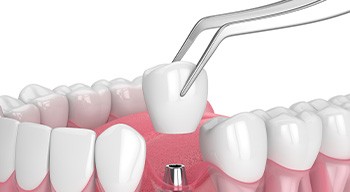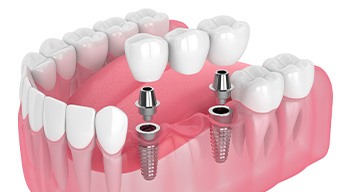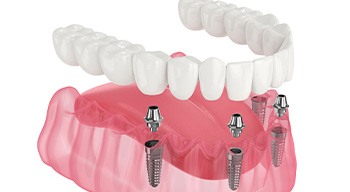Dental Implants — Somerville, NJ
Replace Teeth to Enhance Smiles

After tooth loss, finding a comprehensive solution is crucial for your smile health. Replacement options that don’t restore the underlying root structure, as well as the visible crown, are insufficient for long-lasting results. That’s why more and more dentists are recommending dental implants in Somerville. At Somerset Dental Arts, we partner with local specialists to place and restore the highest quality dental implant prosthetics. Call our team to schedule a dental implant consultation and find out more.
Why Choose Somerset Dental Arts for Dental Implants?
- Partners with Highly Skilled and Trusted Implant Specialists
- Modern Dental Technology in Comfortable Office
- Multiple Financing Options Available
What Are Dental Implants?

Dental implants are essentially prosthetic roots designed to hold dedicated restorations, such as crowns, bridges, and dentures. The entire implant consist of a titanium post, dedicated restoration, and abutment to connect the two together. Because of the way implants integrate with existing bone tissue, you can expect your tooth replacement to be incredibly long-lasting, natural-feeling, and capable of blending in with your existing teeth. Even if you’re replacing an entire arch, your smile will continue to look lifelike thanks to the high-quality materials used for your prosthetic. These reasons and more are why so many dentists recommend them over traditional tooth replacement options.
The 4-Step Dental Implant Process

Getting dental implants requires a unique, multi-step process that spans several months. This might seem like a while, but the long-term benefits you will experience are well worth the wait. Every patient’s treatment looks a little bit different because every smile is unique. However, here are the four main steps that you can expect.
Initial Dental Implant Consultation

The first step towards restoring your smile is to attend a consultation with us. During this visit, we will examine your smile and surrounding facial structures. This will allow us to determine whether dental implants are an ideal tooth replacement solution for you, as well as where and how the implants should be placed. Some patients need preliminary procedures before their implants can be placed, like bone grafting, gum disease treatment, and tooth extractions. Once these treatments are complete, we can move on to planning the rest of your implant treatment. We can walk you through the whole process, including the timeline and the cost.
Dental Implant Surgery

At Somerset Dental Arts, we work with a local specialist for the dental implant placement surgery. This way, we can ensure that our patients are receiving the highest quality care possible. First, your mouth will be numbed with a local anesthetic. Then, a small incision is made into the gum tissue to access your jawbone. The implants are then placed at precise locations and angles. Lastly, your gums will be closed, and protective caps will be placed over the dental implant posts to keep them safe during the healing process.
Dental Implant Osseointegration & Abutment

Over the next few months, the osseointegration process will take place. This is when the titanium implants fuse to the jawbone. This is what gives the implants so much stability like your natural teeth have. Then, you will need another small procedure to have the abutments placed on the posts. Impressions are taken of your smile so the final restoration(s) can be crafted.
Delivery of Dental Implant Restoration(s)

Lastly, you will return to our dental practice to have your restoration placed. This is your crown, bridge, or denture depending on the number of teeth you are missing and where they are located in the mouth. We will check to ensure that everything looks and feels great. Then, you will be sent on your way to enjoy all of the benefits of your new smile.
Benefits of Dental Implants

When considering the benefits of replacing missing teeth in Somerville with dental implants, it is hard to overlook the advantages you’ll receive in comparison to other tooth replacement solutions. Dental implants replace the entirety of the missing teeth, making them much more life-like. Some of the benefits you can expect include the following.
Day-to-Day Benefits

Once your gums and jawbone have completely healed, your dental implants shouldn’t feel much different than your natural teeth. You may even forget which tooth is actually a dental implant! Here are some of the benefits that you can experience every single day:
- Easy Maintenance: You care for your dental implants just like you care for your natural teeth. Just brush, floss, and rinse with mouthwash every day.
- Stronger Bite: Dental implants can restore your bite force up to 90%! This is much more than what you can expect from dental bridges and dentures.
- Confidence Boost: If you are currently missing teeth, it can be easy to lack confidence. Dental implants can completely turn this around.
Health Benefits

Dental implants can have a positive impact on the health of your entire body. Here are some of the ways that they do that:
- Dental Health: Missing teeth increases your risk of numerous dental problems. They include gum disease, misalignment, and additional tooth loss. Dental implants are able to prevent these issues.
- General Health: Dental health and general health are very closely related. When your smile is thriving, you are at lower risk of numerous life-threatening conditions, including diabetes and heart disease.
- Prevents Bone Loss: When your jawbone isn’t being stimulated by regular chewing, the body starts to reabsorb it. Dental implants replace the roots of the missing teeth, therefore stimulating the jawbone and preventing it from deteriorating.
Long-Term Benefits

Dental implants are more costly than traditional dentures and dental bridges. However, there are plenty of good reasons for this. Here are some of the benefits that you can experience for a long time:
- Long-Lasting: Dental implants are very durable. With proper care and maintenance, you can anticipate a restoration that will last multiple decades or even the rest of your life!
- Successful: Dental implants have over a 95% 10-year success rate! Dental implant failure is very uncommon.
- Cost-Effective: Dental implants have a higher upfront cost, but they are made to last a long time. This way, you don’t need to fork out money for repairs and replacements. You also don’t have to stock up on other products to keep your implants in good shape. Best of all, dental implants help to prevent oral health issues from developing, saving you time and money.
Who Dental Implants Can Help

Dental implants are great for replacing one, multiple, or all teeth along a bottom or top row. In other words, no matter how mild or severe your case is, there’s a good chance that dental implants are the solution you’ve been looking for! You can schedule a consultation at our Somerville office to find out for certain, or you can read on to learn a little more on the topic, including the qualities we look for in a good candidate.
Who Is a Good Candidate for Dental Implants?

There are several qualities we look for in a good dental implant candidate, including:
- Healthy teeth and gums
- Sufficient jawbone density
- Good overall health
- Willingness to break bad habits
If something initially stands in your way of being a candidate, like an infection in your gums, don’t worry – we can usually provide the necessary restorative care beforehand. This will add a bit of time to your treatment plan, but it’s essential to the success of your dental implant in the short and long term.
Missing One Tooth

Previously, patients who were missing one tooth were left with one choice: a traditional dental bridge. While this is still a great option for some, it comes with a few downsides, including the fact that healthy enamel often needs to be altered. That’s not the case with dental implants! If we determine this is the best tooth-replacement solution for you, we can place the implant into your jawbone before securing a custom dental crown on top.
Missing Multiple Teeth

If you are missing more than one tooth in a row, there are a few options. The first is replacing each individual tooth with a single dental implant. The second, which is ideal for patients who are missing three or more teeth consecutively, is anchoring two dental implants on either side of the gap and “bridging” the gap with custom-made prosthetic teeth. In both cases, the final result will be a beautiful smile and strong bite!
Missing All Teeth

If you’ve experienced more advanced tooth loss, you should consider an implant partial or full denture.
An implant partial denture is used to replace any number of missing teeth along an arch. Like a traditional partial denture, the base is molded to fit snugly between the remaining healthy teeth. Replacement teeth are attached to the base, and when connected to the dental implants, a partial completes a patient’s smile flawlessly.
A full implant denture, on the other hand, is crafted to fit snuggly in position against the gums. We can typically support the denture with four to six strategically positioned dental implant posts.
When crafted and anchored properly, dental implants provide superior support and stability for the denture, and they typically need to be replaced or repaired less frequently. That makes dental implants a cost-saving alternative over the lifetime of your denture.
Cost of Dental Implants

While more dental insurance companies are beginning to understand the necessity of dental implants, others are still apprehensive to offer coverage. However, that doesn’t mean this uniquely designed solution is out of financial reach. Even if your insurance company will not agree to cover the procedure itself, other factors can lead you to keep more money in your wallet, thus reducing the cost of dental implants in Somerville.
Preliminary Treatments & Dental Implant Surgery

During your initial consultation, Dr. DiGrazia may suggest that you need additional services to prepare your mouth for dental implants. If this is the case, you can expect these treatments will be included as part of your total price tag. Gum disease treatment, tooth extraction, bone grafting, a sinus lift, ridge augmentation, and other options may be required if you want to move forward with dental implant placement.
Also, the surgical procedure that is required to receive dental implants will incur its own cost. Since Dr. DiGrazia partners with local specialists to perform this part of the treatment process, you will receive a separate bill from their office.
The Parts of Your Dental Implant

When reviewing the cost breakdown of your new smile, you’ll find different factors play a role in the total price, such as:
- How many dental implants you need: If you only need one dental implant, you can expect the cost to be much less than if you need between four and six.
- The type of restoration that is required: Creating a custom dental crown is much easier and less expensive than a full denture.
- The materials used: Most dental implants are made of titanium or zirconia, both of which are biocompatible and healthier for your body and smile.
- The brand of dental implants: Dental implants are produced by multiple manufacturers, so you can expect our team will choose those made of higher quality and precision, as they provide longer-lasting results.
How Dental Implants Can Save You Money

No one expects you to be excited about paying more for dental implants as opposed to dentures or dental bridges; however, the investment you make now will pay off down the road. Dentures and dental bridges require replacement every 5-8 years, and some require adhesives to help hold teeth in place while eating or speaking. Dentures also need to be relined every few years because of their ill fit when changes to facial shape occur.
Dental implants require none of this. The titanium or zirconia implant posts can potentially last a lifetime, while the restoration will need to be replaced after 15-20 years (if properly maintained).
Does My Dental Insurance Cover Dental Implants?

Whether your dental insurance will cover dental implants is dependent on their policy and stipulations. Most do not offer coverage for the surgery or placement of these prosthetics; however, you can receive cost savings should you need preliminary treatments. You might also be able to avoid high out-of-pocket expenses when it comes to receiving your custom restoration.
There are several ways you can use your dental insurance benefits to make treatment more affordable, and your dental team will be happy to assist in reviewing your plan.
Making Dental Implants Affordable

At Somerset Dental Arts, we know dental insurance is not something everyone has, so if you are without a private plan, do not think dental implants are out of reach. Instead, you can enroll in our in-house dental membership plan and begin saving immediately. For one low annual fee, you can receive preventive care at no extra charge and take advantage of a 20% discount on other available services.
There is also the option to enroll in flexible financing through CareCredit. By choosing to pay off your dental implant treatment over time instead of all upfront, you can better manage your budget and still walk away with a new and improved, healthier, and more beautiful smile.
Dental Implant FAQs

Even after reading through all the information given above, you may still have a few lingering questions about getting dental implants in Somerville. Since it’s a major treatment that requires surgery, it only makes sense that you want to be well-informed before committing to anything. To help you out, we’ve decided to respond to some of the most common questions we get from patients about the process. If you don’t see your specific question below, feel free to contact our team at Somerset Dental Arts for an answer!
How Long Do Dental Implants Last?
Dental implants are known for being one of the most permanent, long-lasting solutions for missing teeth. With proper care and maintenance, they can easily last patients well over 30 years! Of course, their exact lifespan depends heavily on the patient’s oral hygiene, health, and lifestyle. To ensure your new smile lasts as long as possible, you must be diligent about brushing and flossing, visit your dentist every six months for a checkup and cleaning, and avoid poor habits that can damage your implants (i.e., chewing on ice, smoking, using teeth as tools).
Does Getting Dental Implants Hurt?
Since the dental implant process involves surgery, many patients are concerned that it will be painful. However, it’ll be much more comfortable than you think. Our team at Somerset Dental Arts will take every step necessary to ensure you’re completely relaxed and numbed before starting the procedure. Your mouth will be numbed with a local anesthetic and you’ll most likely be sedated as well, lowering your body’s ability to register pain. Although the surgery itself shouldn’t hurt, your mouth may feel sore for a few days following the procedure. To minimize discomfort, take your pain medication as directed and use cold compresses.
What Can Cause Dental Implants to Fail?
Although dental implants have an impressive success rate of 95%, it’s still entirely possible for them to fail. The two most common causes are peri-implantitis and failed osseointegration (the fusion of the implant to the jawbone). Peri-implantitis is a form of gum disease that results from poor dental hygiene, damaging the bone and gums supporting the implants. Some other causes that can increase your risk of implant failure are chronic teeth grinding, tobacco use, poor oral hygiene, certain medications, and health conditions. At your consultation, our dentist will discuss ways you can lower your chances of implant failure.
How Long Does It Take to Recover from Dental Implant Surgery?
No two smiles are the same, meaning the recovery timeline will vary from person to person. However, most patients can expect to return to their usual routine the day following their surgery. Avoid any strenuous exercise for the first week or so as it could delay healing. After the first couple of days, the bleeding and swelling should gradually stop. Make sure you take your prescribed medication as directed and diligently follow your dentist’s aftercare instructions.
Maintaining & Caring for Your Dental Implants

One of the biggest advantages of dental implants is that they can keep your mouth complete and healthy for the rest of your life. That said, to keep your implants, you need to protect them from damage and infection that could lead to failure. Luckily, maintaining dental implants is very simple; it’s not much different from taking care of the rest of your teeth. Below are some basic steps to keeping your new smile safe.
Make Oral Hygiene a Priority

Dental implants need to be brushed and flossed along with the rest of your smile. Implant posts aren’t susceptible to cavities, but if the tissues holding them in place suffer from gum disease, they may start to come loose. As such, you’ll want to pay close attention to your gums while brushing to make sure you don’t overlook any key areas. Flossing is important as well, as it’s the most reliable way to protect your gums in the areas that a toothbrush can’t clean on its own.
Eat a Healthy Diet

You can enjoy all of your favorite foods with dental implants. While planning your meals, try to limit how many hard, sticky, or sugary foods you’re consuming daily; if you eat them too often, you could end up causing serious problems for your implants. It’s a good idea to eat more foods with calcium and vitamin C, which are vital for keeping your jawbone and your gum tissues healthy.
Break Bad Habits

There are several bad habits that you might perform every day without thinking that can eventually cause dental implants to break or fail. Common examples of habits that can put your implants in danger include:
- Chewing on ice, peppermints, and anything else that’s especially hard.
- Biting your fingernails or the end of your pen when nervous.
- Using your teeth as tools to open packages and other containers.
All of these habits should be broken quickly so that they don’t have a chance to damage your implants. You can replace bad habits with safer ones to protect your smile, such as keeping sugarless gum to chew on or always taking the time to find scissors when you need to open a package.
Schedule Regular Dental Checkups

Checking on your implants will become part of your standard dental checkups once your mouth has healed and you’ve received your final restoration. Our team can check to see if there are any issues in your mouth that could lead to implant failure if left alone for too long. We can also remove any plaque or tartar that could eventually lead to gum disease. With regular preventive checkups and maintenance, you can ensure that your dental implants will stay in your mouth for many years to come.
